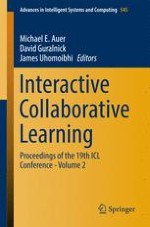This book presents the proceedings of the 19th International Conference on Interactive Collaborative Learning, held 21-23 September 2016 at Clayton Hotel in Belfast, UK.
We are currently witnessing a significant transformation in the development of education. The impact of globalisation on all areas of human life, the exponential acceleration of developments in both technology and the global markets, and the growing need for flexibility and agility are essential and challenging elements of this process that have to be addressed in general, but especially in the context of engineering education. To face these topical and very real challenges, higher education is called upon to find innovative responses.
Since being founded in 1998, this conference has consistently been devoted to finding new approaches to learning, with a focus on collaborative learning. Today the ICL conferences have established themselves as a vital forum for the exchange of information on key trends and findings, and of practical lessons learned while developing and testing elements of new technologies and pedagogies in learning.
